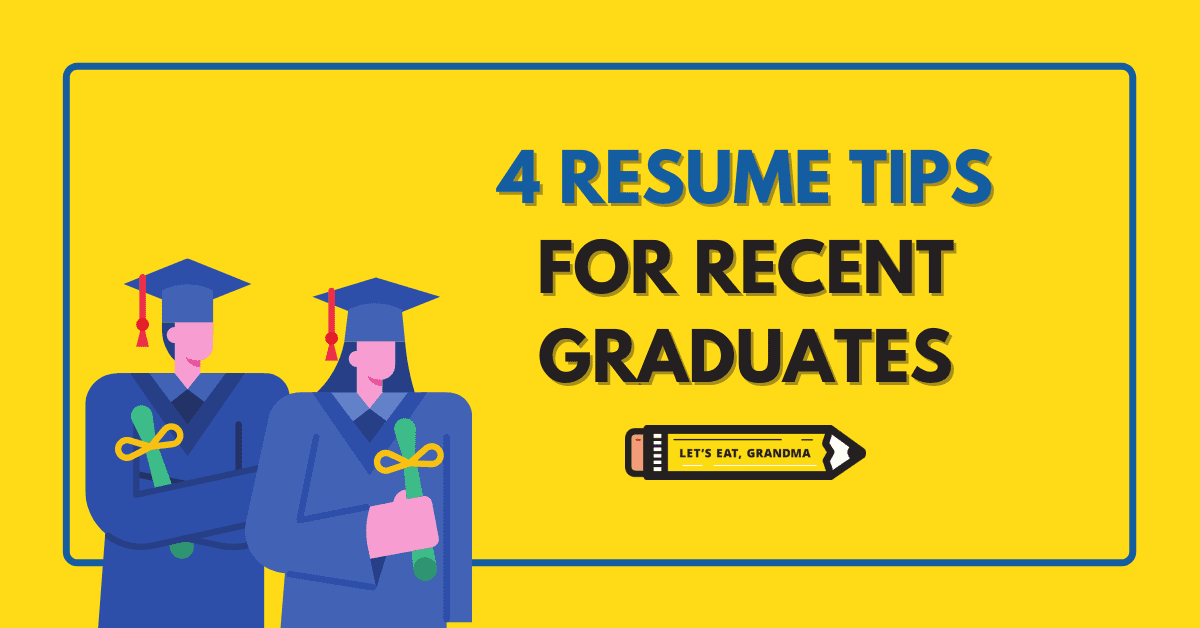4 Resume Tips for Landing Your First Job Out of College

New to your career? No problem! With a little creativity, you still can create a resume brimming with relevant accomplishments.
By: Daniel Lorenzo | Marketing Manager for Let’s Eat, Grandma
Congratulations, new graduate! You’ve worked hard and made your way through four intensive years. You’re ready for the real world, and now you have that prestigious piece of paper to prove it.
As excited and proud as you are, though, I bet you’re also stressed out. Starting with the tension of a socially distant graduation ceremony (or no ceremony at all), you’ve had to deal with a strange transition that’s even stranger than normal. And now, as you’re staring with writer’s block at your resume or frustratedly scrolling through jobs that call for “3-5 years of experience,” I don’t blame you for feeling the burn.
Ready for more job search help?
Sign up for a free Senior Writer Resume Critique to see what's holding you back from landing interviews. One of our top professional resume writers will give you personalized feedback on the top 3 items you can improve based on our expert practices!
But even in a pandemic, landing your first Big Kid Job out of college is far from impossible. There are plenty of things you can do to secure more interviews, starting with our specialty — revamping your resume.
At Let’s Eat, Grandma (notice the comma — we know that good writing can save lives!), we’ve helped over 4,000 clients in their job search with better documents. We’ve learned quite a bit about how to write a resume that employers will love, even if you’re just starting out.
Here are four things you can do to write a stellar first resume out of college. Follow these tips (alongside building a comprehensive networking strategy) and a great job in your field will be within reach.
#1: Leverage Your Education Properly
As a recent graduate, your education is the first box hiring staff will want to mentally check off, and it may be your best opportunity to show off your relevant skills. Don’t just list it as a formality; make it work for you.
Placement
Unless you’ve somehow had six internships at Google, your education section should take pride of place and go at the top of your resume.
Why? Because getting your degree is still generally the most impressive thing you’ve done.
Make sure your degree program, major(s), and any relevant minors are clear. If you transferred, only list the school you earned a degree from.
GPA
Whether or not to list your GPA as part of your education is a debated topic.
As with many things resume-related, there’s no black-and-white answer on whether you should or shouldn’t list your GPA. It’s typically acceptable while you’re still 2-3 years out of college; after that, recruiters won’t care at all. It may help you to include your GPA if it’s remarkably high, but it won’t hurt you not to.
Awards, Coursework, and Extracurriculars
You can list academic awards you’ve received as long as you don’t overdo it with more than one line or so. Similarly, you can also list a precious few relevant courses you took, especially if you don’t have much relevant experience yet or they taught you skills crucial to the job. Format them like this:
You can sometimes list extracurriculars or organizations you were involved in, but don’t just throw them all on there willy-nilly. There’s a big difference between being first chair cellist in the student orchestra for a year and showing up to two Film Club meetings.
Serious extracurriculars show that you managed your time well by fitting them in among classes. That’s very valuable to employers.
My student leadership experience was so involved that I actually listed it as its own item on my first resume:
Heck, they shoulda paid me!
#2: A Job is a Job is a Job is a Job

Even part-time retail positions from college can be resume-worthy with the right spin. Photo by Blake Wisz on Unsplash.
And yes, I mean internships, too! Regardless of whether or not you were paid, any internship, work-study job, or volunteer experience can be used as experience on your resume to show off your skills.
One of my least favorite things to hear from young job seekers is that they don’t feel their experience is “real experience.” Any experience you’ve had in college can be impressive if you use it to sell the skills you learned.
Describe your experiences with bullets that include active verbs, metrics, and results, focusing on your accomplishments rather than your day-to-day duties. Write only about what you got done and how it’s relevant to the job you’re applying for.
Remember — your resume is about selling yourself as the best candidate for the job, not simply summarizing each of your past jobs. The latter isn’t even really a resume, it’s a job description!
Check out the difference between these two bullet points. They describe the same job, but one could go on anyone’s resume, while the other will pique a recruiter’s interest:
- Responsible for editing video clips to assist with creating social media content (Booo…)
- Edited over 50 pieces of collateral using Final Cut Pro to produce four engaging Facebook videos that reached an average of 10,000 users (Woohoo!)
Plus, you probably had to work at least one office or retail job to make ends meet during school. Being a “lowly” barista, retail sales associate, or student office coordinator might not be directly relevant to the Analyst or Engineer positions you’re applying for, but guess what? It was still a job.
While you should more strongly emphasize relevant internships and relevant volunteer experiences, you should still list any of these part-time work experiences if you have room.
Again, these jobs show a lot. You might not think that it’s impressive that you waited tables. However, it’s very impressive that you multitasked, trained new employees, and dealt with difficult customers.
And, don’t forget volunteer experience. Use an Additional Experience or Leadership section to list any extra volunteer work you may have done throughout college. Whether it was a three-month or three-year commitment, volunteer work shows that you take the initiative to better your skills and your community. If the work you did is directly related to your area of interest, all the better, you can reference that in the section title directly: “Additional Nonprofit Experience.”
#3: Keep it to One Page (For Now)
If you ever want to see an all-out brawl, get four or five career coaches in a room and ask them how many pages a resume should be.
This is a hot topic in the resume world. Your parents may have told you that all resumes need to be one page, but if you’ve done some research, you may have also found some reputable sources telling you that a two-page resume is okay. Which is it?
The real answer is, “it depends.” Conventions are starting to shift and two-pagers are generally becoming acceptable for some experienced job seekers if they need the extra room. (There’s even some evidence that some recruiters will prefer two-page resumes from certain candidates!)
But don’t run wild with advice that is meant to depend on the situation. We believe, along with many career professionals, that in your situation as an entry-level recent graduate, your resume should stay at one page.
You don’t have enough experience to justify a second page until at least five or so years out of college. If your resume is running onto two pages, it likely means you need to cut down some words, clean up the formatting, or both.
Plus, remember that your resume doesn’t exist in a vacuum. Anything you cut from your resume can go on your LinkedIn profile, which recruiters will check. Though your LinkedIn profile should still be concise, it can serve as an expanded professional picture of you with fewer space or time constraints than your resume.
#4: Use a Clean, ATS-Friendly Resume Design

Use a standard format so that the ATS doesn’t pass over your accomplishments. Photo by John Schnobrich on Unsplash.
*deep breath*
… let’s talk about templates.
There’s a wide variety of resume templates available online. Many of them free and billed as “modern,” both of which make them attractive to recent grads. But they’re often … ahem, how do I say this? Not good.
Have you heard of Applicant Tracking Systems? It’s a story for another blog, but basically, an ATS is a type of software program used by the majority of mid- to large-sized companies to scan, filter, and organize the applications that are sent in for each open job. It parses the text of your resume (and the application form) to make your application searchable so that recruiters can search for qualified candidates first.
This means that whenever you apply for a job through an online portal (a job board or the company website), your resume needs to be optimized with keywords from the job description that a recruiter will search for, and your design needs to be scannable by an ATS.
And here’s the thing: many of those fancy templates you see will get eaten alive in an ATS. There are many design factors that ATS software simply can’t read, which means they could keep your resume from appearing in a recruiter’s search results. To prevent this, you need to format your resume so that it:
- Only uses one column — ATS software only parses text left to right
- Doesn’t include any info in text boxes, tables, charts, graphics, or images
- Uses standard section headings (“Summary of Qualifications” instead of “About Me,” “Professional Experience” instead of “Where I’ve Been”)
All of these factors enable an ATS to accurately parse your text. That ensures you won’t run into any hiccups that might make your resume harder for the recruiter to find. (For a full list of ATS design factors, check out this graphic.)
Plus, even if ATS wasn’t a concern, hiring decision-makers don’t care as much about stylish resumes as you’d think. They’re far more concerned with easily finding what they’re looking for in your resume than how pretty or exciting it looks.
There you have it, new grad — apply these resume tips to get on your way to a solid job, even in a pandemic!
If you need more help with your resume, cover letter, or LinkedIn profile, Let’s Eat, Grandma can give you a leg up.
Our team of business writing experts has put together a line of affordable job search packages specifically for recent grads, starting at just $15! You’ll get a 70-page eBook, and three ATS-friendly templates, and you can upgrade to receive a 30-minute consultation with a professional resume writer. Check out your options here.
Ready for more job search help?
Sign up for a free Senior Writer Resume Critique to see what's holding you back from landing interviews. One of our top professional resume writers will give you personalized feedback on the top 3 items you can improve based on our expert practices!
Better Resume.
Satisfying Career.
Happier You.


